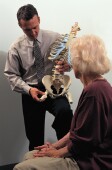- Double Mastectomy May Offer No Survival Benefit to Women With Breast Cancer
- Toxic Lead Found in Cinnamon Product, FDA Says
- Certain Abbott Blood Sugar Monitors May Give Incorrect Readings
- Athletes Can Expect High Ozone, Pollen Counts for Paris Olympics
- Fake Oxycontin Pills Widespread and Potentially Deadly: Report
- Shingles Vaccine Could Lower Dementia Risk
- Your Odds for Accidental Gun Death Rise Greatly in Certain States
- Kids From Poorer Families Less Likely to Survive Cancer
- Tough Workouts Won’t Trigger Cardiac Arrest in Folks With Long QT Syndrome
- At-Home Colon Cancer Test Can Save Lives
Sleep Apnea Common After Spinal Cord Injury, Study Finds

TUESDAY, Jan. 28People with spinal cord injuries should be assessed for sleep apnea, researchers suggest.
In a study that looked at 26 people with cervical (neck) and thoracic (upper mid-back) spinal cord injuries, investigators found that 77 percent of them had breathing problems during sleep and 92 percent had poor sleep quality.
The nature of the breathing problems experienced by these patients during sleep is complex, and many of them had both obstructive and central sleep apnea. Obstructive sleep apnea causes the airway to collapse or become blocked during sleep, while in central sleep apnea, the brain fails to send the proper signals to the muscles that control breathing.
Central sleep apnea was more common in patients with cervical spinal injuries than in those with thoracic spinal injuries, according to the study published recently in the Journal of Clinical Sleep Medicine.
“The majority of spinal cord injury survivors have symptomatic sleep-disordered breathing and poor sleep that may be missed if not carefully assessed,” lead author Dr. Abdulghani Sankari, physician scientist at John D. Dingell VA Medical Center and Wayne State University School of Medicine in Detroit, said in a journal news release.
“Our findings help in identifying the mechanism of sleep-disordered breathing in spinal cord injury and may provide potential targets for new treatment,” he added.
Breathing problems during sleep may increase spinal cord injury patients’ risk of cardiovascular death, noted study co-author Dr. M. Safwan Badr, the president of the American Academy of Sleep Medicine.
“All spinal cord injury patients should undergo a comprehensive sleep evaluation using full, overnight polysomnography for the accurate diagnosis of sleep apnea,” Badr said in the news release.
More information
The U.S. National Institute of Neurological Disorders and Stroke has more about spinal cord injuries.
Source: HealthDay
Copyright © 2024 HealthDay. All rights reserved.










